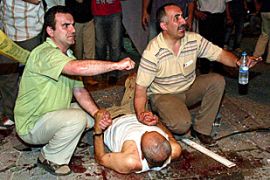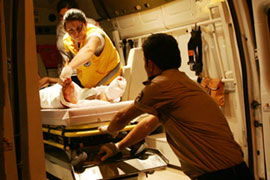Turkey PM blames PKK for blasts
Erdogan says bombings in Istanbul are “the cost” of crackdown on Kurdish fighters.

During the prime minister’s visit local residents chanted “down with the PKK”.
Later 5,000 mourners, including Erdogan and several government ministers, attended a funeral for 10 of the blast victims.
PKK denial
Muammer Guler, Istanbul’s governor, said five of those killed were children and warned the death toll could rise with six people still in critical condition.
Asked whether the PKK was responsible, he said: “Of course there appears to be a link with the separatist organisation. We are working on that. We hope to get a result at the first opportunity.”
However, a senior Kurdish fighter denied any PKK involvement.
Speaking to the pro-PKK Firat news agency, Zubeyir Aydar said: “The Kurdish liberation movement is not involved in this attack”.
He said the attack was the work of “sinister forces” and timed to coincide with the AKP trial and a pending case against the “Ergenekon” nationalist group which is alleged to have organised attacks and plotted assassinations to create chaos and prompt a military coup against Erdogan’s government.
The Turkish army has recently stepped up operations against the PKK and on Sunday morning Turkish fighter jets bombed PKK camps in the Qandil mountains in northern Iraq, a major PKK stronghold, on Sunday morning.
A newspaper said Turkish police had detained three teenagers in connection
with the blasts, but Guler would not confirm the report.
Scenes of panic
The explosions were the deadliest attack against civilians in Turkey since 2003, when 63 people were killed in four suicide bombings in Istanbul blamed on al-Qaeda.
 |
| Both bombs were planted in concrete rubbish bins on a crowded street [AFP] |
Both bombs were planted in concrete rubbish containers on a crowded pedestrian street lined with shops and cafes in the popular Gungoren neighbourhood on Istanbul’s European side.
A small device first went off first at around 2200 (1900 GMT) on Sunday, creating the initial panic, officials said.
A second, more powerful explosion followed about 10 minutes later about 50 metres away as passers-by and residents milled around the site of the first blast.
The second bomb claimed all the lives, including that of a 12-year-old girl hit in the heart by a piece of shrapnel as she stood watching from her fourth-storey balcony.
There were scenes of panic with people covered in blood fleeing the area littered with debris and shattered glass.
“People gathered after the first blast. There was a real crowd. Five to 10 minutes later there was another one, much stronger than the first,” said Alaattin Hatayoglu, a local resident.
“The building I was in was shaking. People were wounded in a 40-metre radius.”
US support
Following the attacks, the United States pledged its support to Turkey.
Gordon Johndroe, a National Security Council spokesman, said: “We offer our sincere condolences to those who have lost loved ones in these tragic attacks. We stand with the people of Turkey as they confront terrorism. We will continue to partner with them to deal with this problem.”
Erdogan, who cancelled a weekly cabinet meeting Monday to visit the site of the attack in Istanbul, pledged that the perpetrators would be caught and punished.
“Those responsible for this savagery, wherever they are, will not escape the end that awaits them. The strongest response our nation will give to this attack… will be to strengthen our unity,” he said.
Meanwhile, at about the same time as the Istanbul attack, a PKK fighter hurled a hand grenade at a police station in Bingol, a provincial capital in Turkey’s mainly Kurdish southeast, before being shot dead, officials said.
Two other fighters who took part in the attack were wounded and captured, according to the officials.
The PKK, listed as a terrorist group by Turkey and much of the international community, took up arms for Kurdish self-rule in the southeast in 1984, sparking a conflict that has claimed more than 37,000 lives.